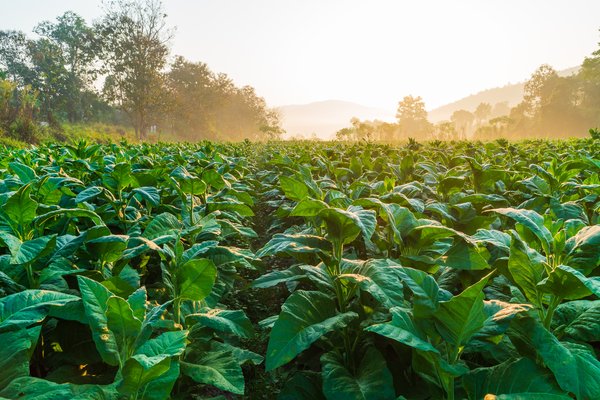As a lifestyle and diet, veganism has been around for millennia, but plant-based eating only recently has become big business. Companies such as Beyond Meat (BYND 0.2%) and Oatly (OTLY -0.58%) command multibillion-dollar valuations. Packaged food titans such as Tyson Foods (TSN -0.53%) have launched their own vegan brands, and startups such as Impossible Foods are racing to go public.

According to data from Allied Market Research, the global vegan food market is expected to grow by a compound annual rate of 6.4% through 2030, easily outpacing the overall food industry. Categories such as plant-based meat and oat milk are expected to grow at even faster rates. UBS predicts plant-based protein will grow more than 27% annually from $4.6 billion in 2018 to $85 billion in 2030, while Keefe, Bruyette & Woods expects annual growth in the oat milk sector will top 13%.
A number of factors are boosting the performance of plant-based stocks, including healthy eating trends, environmental concerns, economies of scale, and technological innovations. If you want vegan companies to invest in, you have plenty of options these days.
6 best vegan stocks
6 best vegan stocks in 2025
Here are six top picks for vegan stocks:
| Company | Market Capitalization | Description |
|---|---|---|
| Beyond Meat (NASDAQ:BYND) | $261.5 million | Innovative producer of plant-based substitutes for ground beef, sausage, and chicken. |
| Oatly (NASDAQ:OTLY) | $427.4 million | Maker of oat milk and other plant-based dairy alternatives made from oats. |
| Calavo Growers (NASDAQ:CVGW) | $424.2 million | Producer of avocados and other fresh fruits and vegetables. |
| Laird Superfood (NYSE:LSF) | $82.5 million | Maker of vegan coffee creamers and other vegan beverages and snacks. |
| Local Bounti (NYSE:LOCL) | $19.5 million | Ag tech start-up using vertical farming and hydroponic greenhouses. |
| Mission Produce (NASDAQ:AVO) | $999.9 million | Global producer of avocados and mangoes. |
Let's take a closer look at each of these plant-based companies.
1. Beyond Meat
Beyond Meat is a leader in the plant-based meat substitute industry. Before the COVID-19 pandemic, its revenue was growing at triple-digit rates, although growth has slowed dramatically since then. The company's products have become ubiquitous at supermarkets and common on restaurant menus. As of September 2024, Beyond Meat reported its products were available at approximately 129,000 retail and food service locations in more than 90 countries.
Revenue
The company continues to innovate and introduce new products in the vegan meat substitute category, including its fourth generation of the Beyond Burger, Beyond Beef, and Beyond Sun Sausage. Beyond Meat has historically spent heavily -- around 10% of its revenue -- on research and development (R&D), which should enable the company to hold its leadership position over time. It excels at developing new products, advancing its technology, and making quality improvements.
2. Oatly
Oatly made a splash with its initial public offering (IPO) in May 2021. The Swedish oat milk brand has shaken up the plant-based milk category, and oat milk has passed soy milk to become the second best-selling alternative after almond milk.
While Oatly has captured attention with a bold marketing campaign and a new product category in the U.S., the company has been around since the 1990s and has been consistently developing oat-based alternative dairy products, including milk, ice cream, yogurt, cooking creams, spreads, and to-go drinks.
Oatly's products are now available in more than 65,000 stores and more than 60,000 coffee shops. Its revenue rose 8.5% to $783.3 million in 2023 compared to the previous year, although Oatly is currently unprofitable because it is spending aggressively on marketing. Its growth has also slowed significantly since its IPO and as of the end of 2024, the company was pursuing an "asset-light" strategy, shuttering facilities to improve its cost structure, utilization, and efficiency.
3. Calavo Growers
Avocados are a staple of the vegan diet in much of the world, and they are popular with the millennial generation. About half of Calavo Growers’ revenue comes from avocados, and growth in the category helped the company's stock price to triple between 2011 and 2020. Shares have pulled back since then amid volatility in avocado prices and falling profits as the company pursued growth in lower-margin products. Investors are hopeful that the return of former CEO Lee Cole will restore the company's earlier success.
As a commodities producer, Calavo faces stiff competition. Prices for commodities such as avocados are constantly changing. But since it takes as long as 13 years to grow an avocado tree, and demand for the fruit is rising, the company should be well-positioned for long-term growth.
Commodities
4. Laird Superfood
Laird Superfood, a vegan food company founded by athletes Laird Hamilton and Gabby Reece, has risen from the dead. At one point, the company looked like it was headed for bankruptcy, but the stock soared through 2024 as its decision to shut down its manufacturing plant and move to a co-packing model has paid off, improving its cost structure.
The company has since returned growth and is posting strong results in e-commerce, which makes up a majority of its sales. Better in-stock rates led to sales on Amazon more than doubling in the third quarter of 2024, and other business improvements like direct procurement of raw materials have helped the business approach a break-even point.
Laird Superfood is best known for its plant-based coffee creamers, based on coconut milk powder, healthy fats, and organic coconut sugar, but the company also sells beverages, snacks, and supplements like Performance Mushrooms. Still, 60% of its sales in 2023 came from coffee creamers.
If Laird can maintain its recent momentum and achieve profitability, the stock should continue to climb.
5. Local Bounti
Local Bounti is one of several “ag tech” companies that have gone public in recent years, using new technologies in the age-old agriculture industry.
Founded in 2018, Local Bounti grows lettuce and herbs and uses a patented technology it calls “Stack and Flow,” which it describes as a combination of vertical farming and hydroponic greenhouse farming. Its techniques are more environmentally sustainable than traditional agriculture, using 90% less water and 90% less land while increasing harvest efficiency, and it focuses largely on lettuce and other leafy greens.
Local Bounti has made relatively little revenue so far, and management will be well short of its earlier target of $462 million in revenue by 2025, but the company is growing. In the third quarter of 2024, revenue rose 50% to $10.2 million as it increased production at several facilities. It expects to achieve positive adjusted earnings before interest, taxes, depreciation, and amortization (EBITDA) in the second quarter of 2025. The company has partnered with retailers including Walmart-owned Sam's Club and Brookshire Grocery.
Local Bounti is a high-risk stock, but after the bankruptcy of AppHarvest, it looks like the best bet in indoor agriculture, an emerging industry with advantages over traditional agriculture.
6. Mission Produce
Another avocado seller to make the list, Mission Produce went public in 2020 and calls itself the world’s most advanced avocado network. It buys avocados from around the world, including California, Mexico, Peru, South Africa, and New Zealand, and owns more than 10,000 acres globally. The company also sells mangoes.
Like other industries, the avocado industry has been challenged at times by supply chain issues and labor shortages, though avocado prices soared through 2024.
That drove revenue up 37% to $354.4 million in fiscal 2024, which ended on Oct. 31, 2024, and adjusted EBITDA more than doubled. While demand for avocados should remain strong, investors should be aware that prices are volatile so Mission's results will be sensitive to underlying commodity prices.
Related investing topics
Investing in vegan ETFs
Investing in vegan ETFs
New entrant VegTech Plant-based Innovation & Climate ETF (EATV 0.43%) is the best option if you’re looking for exposure to a wide range of plant-based stocks, including Ingredion (INGR -1.61%), Vita Coco (COCO -1.43%), and Mission Produce.
U.S. Vegan Climate ETF (VEGN -2.08%) is also available, but its holdings are weighted toward tech and generally resemble the S&P 500. The ETF’s biggest holdings are Tesla, Nvidia, and Apple.
Exchange-Traded Fund (ETF)
FAQs
Vegan stock FAQs
How do you find new vegan stocks?
There’s no easy way to track vegan stocks coming to the market, but an occasional search for terms such as "vegan IPO" and "vegan companies going public" should help you discover new vegan stocks.
Is Impossible Burger publicly traded?
Impossible Foods, the maker of the Impossible Burger, is not currently publicly traded. Reuters reported in April 2024 that the company was targeting a "liquidity event" in the next two to three years that could include an IPO, a sale to another company, or another round to raise capital.
The company last raised $500 million at a $7 billion valuation in 2021, but its valuation is believed to have fallen significantly amid broader weakness in the plant-based meat industry.
Does Beyond Meat pay dividends?
Beyond Meat doesn’t currently pay a dividend. The company is unprofitable, and management has said that it does not intend to pay a dividend for the foreseeable future.















